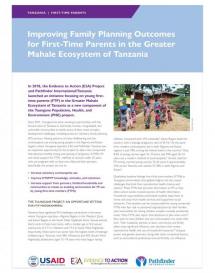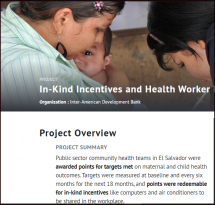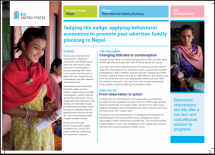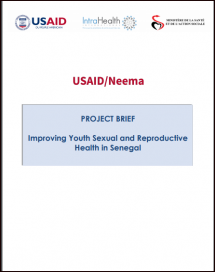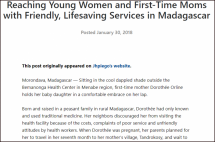Improving Family Planning Outcomes for First-Time Parents in the Greater Mahale Ecosystem of Tanzania (Brief)
This brief describes an initiative launched in Tanzania in 2018. Evidence to Action (E2A) Project and Pathfinder International worked together, focusing on young first-time parents (FTPs) in the Greater Mahale Ecosystem of Tanzania as a new component of the Tuungane Population, Health, and Environment (PHE) project.
The Evidence to Action (E2A) Project and Tuungane collected quantitative and qualitative data that provided insights into FP-related outcomes of interest, including uptake of modern contraceptive methods and the underlying issues—such as FP attitudes, communication, and decision-making—that influence informed, voluntary FP use.
Findings included the following:
- Voluntary use of modern contraceptive methods increased from 35% to 66% among FTM peer group members over the course of the intervention
- There was over a 750% increase in oral contraceptive use among FTM peer group members
- Of the peer group members who adopted FP over the course of the intervention, the majority were new FP users
- Qualitative findings indicate that the FTP intervention helped both married and unmarried FTMs deepen their understanding of the benefits healthy timing and spacing of pregnancy (HTSP)
- Peer group FTMs noted improved communications about FP with their partners
- FTM peer group members reported sharing their knowledge and experiences with others in their communities, suggesting a diffusion of key messages and ideas beyond those directly engaged in the program
Source: Evidence to Action (E2A) Project
Date of Publication: August 3, 2020
SIMILIAR RESOURCES
Tools
Examples
- Lessons Learned from an Integrated Approach for Reaching First-time Young Parents in Nigeria
- Scaling-Up First-Time and Young Parent Access to Postpartum Family Planning: Could Small Shifts Change the Game?
- Meeting the Sexual and Reproductive Health Needs of Young Married Women and First-time Parents Toolkit
- First Time Parents
- Training Tools: Providing Family Planning and Reproductive Health to Young Married Women and First-Time Parents in West Africa
- Connect: Increasing Use of Pospartum Family Planning by First-Time Parents
- Evidence to Action (E2A) Project's First-Time Parent Framework
- Beyond the ABCs of FTPs: A Deep Dive into Emerging Considerations for First Time Parent Programs
- Factors Impacting Use of Health Services by First-time/Young parents: A Formative Research Toolkit
- “Because my Husband and I Have Never Had a Baby Before…” Results and Lessons from Interventions with First-Time Parents in Madagascar, Mozambique, and Nigeria
- Improving Health and Gender Outcomes for First-Time Parents in Cross River State, Nigeria
- Reaching Young Women and First-Time Moms with Friendly, Lifesaving Services in Madagascar
- Reaching Young Married Women & First-Time Parents for Healthy Timing and Spacing of Pregnancies
- REAL Fathers Initiative
- Setting Newlyweds Up for Success: A Young Couple Talks Straight about Family Planning in Congo

